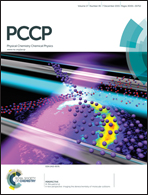Electrochemistry and speciation of Au+ in a deep eutectic solvent: growth and morphology of galvanic immersion coatings
Abstract
In this study we compare the electrochemical and structural properties of three gold salts AuCl, AuCN and KAu(CN)2 in a Deep Eutectic Solvent (DES) electrolyte (Ethaline 200) in order to elucidate factors affecting the galvanic deposition of gold coatings on nickel substrates. A chemically reversible diffusion limited response was observed for AuCl, whereas AuCN and KAu(CN)2 showed much more complicated, kinetically limited responses. Galvanic exchange reactions were performed on nickel substrates from DES solutions of the three gold salts; the AuCN gave a bright gold coating, the KAu(CN)2 solution give a visibly thin coating, whilst the coating from AuCl was dull, friable and poorly adhesive. This behaviour was rationalised by the differing speciation for each of these compounds, as evidenced by EXAFS methods. Analysis of EXAFS data shows that AuCl forms the chlorido-complex [AuCl2]−, AuCN forms a mixed [AuCl(CN)]− species, whereas KAu(CN)2 maintains its [Au(CN)2]− structure. The more labile Cl− enables easier reduction of Au when compared to the tightly bound cyanide species, hence leading to slower kinetics of deposition and differing electrochemical behaviour. We conclude that metal speciation in DESs is a function of the initial metal salt and that this has a strong influence on the mechanism and rate of growth, as well as on the morphology of the metal deposit obtained. In addition, these coatings are also extremely promising from a technological perspective as Electroless Nickel Immersion Gold (ENIG) finishes in the printed circuit board (PCB) industry, where the elimination of acid in gold plating formulation could potentially lead to more reliable coatings. Consequently, these results are both significant and timely.



 Please wait while we load your content...
Please wait while we load your content...